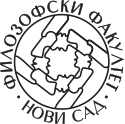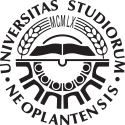15MKMK063 - Cognitive Theory of Metaphor
| Course specification | ||||
|---|---|---|---|---|
| Course title | Cognitive Theory of Metaphor | |||
| Acronym | 15MKMK063 | |||
| Study programme | Hungarian language and literature | |||
| Module | ||||
| Type of study | first degree undergraduate academic studies | |||
| Lecturer (for classes) | ||||
| Lecturer/Associate (for practice) | ||||
| Lecturer/Associate (for OTC) | ||||
| ESPB | 3.0 | Status | ||
| Condition | – | Oblik uslovljenosti | ||
| The goal | Acquaint students with the fundamentals of cognitive theory of metaphor. Application of the acquired knowledge in text analysis and comprehension. Study of the system of metaphorical expression on various language levels, in different types of texts, and in various language strata; mapping the web of functional strategies. | |||
| The outcome | Students are able to recognize the functioning of cognitive metaphors in every-day language use, in scientific register and in poetry. Students can approach the notion of metaphor on interdisciplinary level, and by discovering the connections between the levels of metaphorical strata they are able to comprehend the fact that language is a complex but cohesive universe. | |||
| Contents | ||||
| Contents of lectures | Cognitive theory of language and cognitive grammar. The notion of cognitive metaphors. Cognitive metaphors and the linguistic image of the world. Cognitive metaphors in every-day life in science and in poetic language. The process of metaphorisation. Stylistic devices originating from metaphorisation. Cognitive metaphors in publicist texts. Slang and metaphors. Cognitive metaphors in advertisements. Cognitive metaphors in translations. | |||
| Contents of exercises | Examining metaphors in the every-day language of the press and in literary works. Collecting metaphorical expressions in various topical areas, compiling questionnaires and result analyses. Making and delivering presentations. Independent research. | |||
| Literature | ||||
| ||||
| Number of hours per week during the semester/trimester/year | ||||
| Lectures | Exercises | OTC | Study and Research | Other classes |
| 1 | 1 | |||
| Methods of teaching | Presentation of theoretical topics in short lecture form. Students’ individual study using referential literature. Solving practical tasks – making a joint module – in groups of five. Presentations are delivered through visual programs and multimedia tools. | |||
| Knowledge score (maximum points 100) | ||||
| Pre obligations | Points | Final exam | Points | |
| Activites during lectures | 10 | Test paper | 30 | |
| Practical lessons | Oral examination | 20 | ||
| Projects | ||||
| Colloquia | 20 | |||
| Seminars | 20 | |||

